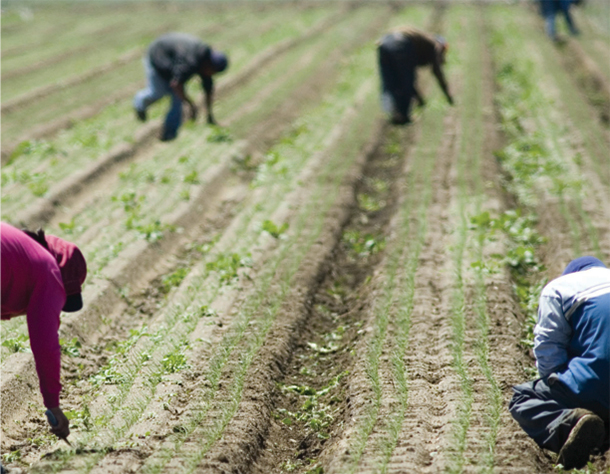Every day, temporary foreign workers in some of British Columbia’s greenhouses are monitored by technology. The time they take for each task is tracked and sometimes posted on electronic boards — the workers ranked by how productive they’ve been.
But the pressure to work faster and faster, and the insecurity that comes with their temporary status, leads to stress-related health problems, say workers and their advocates.
At The Tyee’s recent forum on work, (In)secure: The Future of Working, panelist Byron Cruz, a health outreach worker with Sanctuary Health — a community group that helps undocumented people in B.C. get access to health care — spoke about a variety of issues facing temporary foreign workers in the agricultural sector.
Wearable GPS devices, he said, are the latest developments in the use of technology to push seasonal employees to work faster and maximize profits.
One farm, he said, uses these devices to track where a worker is in a greenhouse and monitor how much time they spend in the washroom.
“At the end of the season, all of this is taken into account in terms of how much production they were able to do,” said Cruz in a follow-up interview. “If the manager or the owner of the farm are mad at these guys, then they will not come back next season.”
Monitoring employees’ productivity is not unique to the agricultural sector. But among this most precarious group of workers, the effects can be profound.
Cruz said that life is difficult for workers on some B.C. farms. Many work extremely long hours and are under constant pressure.
At a recent workshop held by the Migrant Workers’ Dignity Association, an organization that works for the rights of temporary foreign workers in Canada, Mexican workers from farms in Langley and Delta spoke about overcrowded living conditions and lack of assistance when workers needed medical attention.
One worker, speaking through translator Raul Gatica, the association’s director, described the devices used in greenhouses to measure productivity.
“The majority of the farms, they have this system, checking you when you start one line and when you finish the line,” he said. “This is a kind of scanner, similar to a cell phone.”
Workers push a button when they start down a row of produce. When they finish the line they push another button. This measures the speed at which they completed the row.
The same worker — who, like others quoted in this story, did not want to be identified for fear of losing his job — described screens that rank workers based on their speed.
“The guy who is on the bottom, they want to run in order to catch up the others. And the one who is on the top, they want to still be on the top and they go working harder and harder. This screen made a competition among the workers,” he said.
Though many farms pay speed bonuses to workers based on the results of productivity monitoring, one worker said he has seen speed expectations rise year by year
“They want [us to] perform it faster, paying less, make a lot of pressure against us,” he said. “So I start to get less payment [for] working more.”
A worker who is currently employed on one of B.C.’s cranberry farms said such surveillance and competition causes extreme stress.
“We start to get health problems. We arrive at home more tired. All those things affect us and there’s no one who helps us to solve those issues,” he said, describing headaches and lost sleep he has experienced due to work pressure.
“I call to Mexico to my wife and I say ‘I am suffering a lot, I can’t [endure] anymore.’ It was so hard. But it is because of the pressure of the employers. They don’t give us a chance to work in a good way.”
The use of technology to monitor the productivity of workers is increasing in many sectors of the economy, not just in agriculture, said Linda Delli Santi, executive director of the B.C. Greenhouse Growers’ Association.
“This is not a new practice in any industry,” she said. “I think that the pressure to do a good job in a timely fashion has always been there and always will be.”
Delli Santi cited fast food restaurants, retail outlets and grocery stores as examples of employers that use technology to monitor the speed of workers.
The agricultural sector is advanced in its use of technology, with every aspect of a greenhouse’s climate controlled by computer. Devices that monitor productivity, she said, are simply a labour management tool that are integrated into the rest of the system.
Monitoring employees’ washroom breaks, Delli Santi said, “is totally inappropriate.”
The employers she contacted denied monitoring their workers’ locations. They said they simply use the data to track yield records, deploy workers to where they’re most needed within greenhouses and monitor productivity.
“It’s more of a training tool than anything else. It’s certainly not for discipline,” she said.
Delli Santi suggested that if employers break employment laws — or push for productivity beyond reasonable limits — workers should make complaints to the Canadian government or their home country’s consulate.
But with hundreds of workers waiting for a chance to get into the Temporary Foreign Worker Program, displeasing an employer is not a risk many workers are willing to take.
The threat of job loss, said workers at the Migrant Worker Dignity Association, is what causes them the most stress.
“I guess that is our biggest fear, is to be expelled from the program,” said one worker. “They say that we are troublemaker workers. And they threaten us and they fire us from the program. And that’s why we have to accept everything.”
Inevitable change?
As technology advances, this kind of productivity monitoring is likely an inevitable part of the future of work. While employers see it as a way to improve business efficiency, precarious employees, in particular, are vulnerable to exploitative practices.
And migrant farm workers are one group of precarious workers that is quickly growing. Since 2009, the number of temporary foreign workers on B.C. farms has more than doubled.
Those numbers are likely to continue growing as the federal government moves to increase Canada’s agricultural exports.
Seasonal agricultural workers play a critical role in Canada’s agricultural sector, said Robert Russo, a lecturer at UBC’s Allard School of Law.
But when treatment of workers is left to the discretion of individual farm owners, abuses are inevitable. With no route to citizenship or permanent residency, foreign farm workers are in a vulnerable position.
Unionization could help, said Russo, whose PhD research focused on collective organizing among migrant farm workers, but industry employers fight against union organizing.
The structure of the programs that bring foreign workers into Canada also make unionization difficult, he said.
“Employers can threaten those migrant workers who are seen to be complaining or agitating for unionization or any other labour rights,” he said. “It’s very common for employers to threaten them — maybe not directly but indirectly — that they won’t be recalled for a subsequent season.”
Byron Cruz said that a provincial government more friendly towards unions might result in better union support for migrant farm workers. A mobile workers’ support centre, he said, would be one initiative that could help farm workers.
Cruz also points to employer-specific contracts as part of the problem that perpetuates poor working conditions.
“They cannot change employers,” he said. “This makes their lives hard. They cannot change from farm to farm.”
The federal government is considering the elimination of employer-specific work permits, but says that if work permits are not linked to specific employers, it could reduce the government’s ability to hold employers accountable for breaking rules around the hiring of temporary foreign workers.
At a provincial level, B.C.’s enforcement of employment standards has declined. The province switched in recent years from proactive enforcement to a complaints-based system.
But language barriers and a lack of understanding around Canadian workplace laws present problems for migrant workers wishing to make complaints about abusive treatment by employers.
All levels of government, said Russo, need to be involved in overseeing working and housing conditions for foreign workers on Canadian farms.
“You have to have the federal government working in partnership with the provincial government where it’s a provincial jurisdiction,” he said. “And I think you need to have cooperation with municipal authorities when it’s a housing issue.”
For his part, Raul Gatica does not believe that any government is motivated to make meaningful changes to improve conditions for migrant workers in Canada.
He believes the solution to improved working conditions for this growing segment of the labour force is in the hands of the workers themselves.
“The only chance that we have to change things is to create a worker movement,” he said. “If we are capable to be organized, to act together, to have a common agenda, and we are ready to act, we have the capacity to make changes.” ![]()
Read more: Rights + Justice, Labour + Industry, Science + Tech

















Tyee Commenting Guidelines
Comments that violate guidelines risk being deleted, and violations may result in a temporary or permanent user ban. Maintain the spirit of good conversation to stay in the discussion.
*Please note The Tyee is not a forum for spreading misinformation about COVID-19, denying its existence or minimizing its risk to public health.
Do:
Do not: